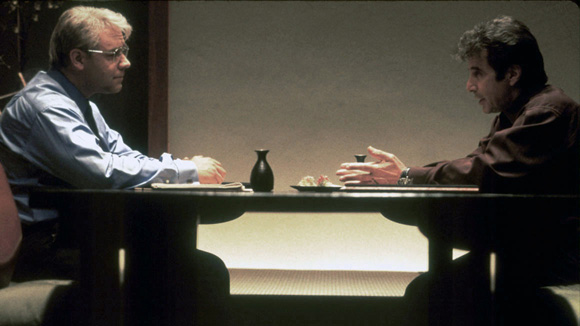(1999) True Life Drama (Touchstone) Russell Crowe, Al Pacino, Christopher Plummer, Diana Venora, Philip Baker Hall, Lindsay Crouse, Debi Mazar, Stephen Tobolowski, Colm Feore, Bruce McGill, Gina Gershon, Michael Gambon, Rip Torn, Lynne Thigpen. Directed by Michael Mann
On one level, this movie could be taken as the story of Dr. Jeffrey Wigand, the corporate whistleblower who braved much external pressure, death threats, the dissolution of his family and the pangs of his own conscience to step forward and point the finger at Big Tobacco, making several lawsuits against them possible.
On another level, this movie could be taken as the story of Lowell Bergman, the courageous producer who brought Wigand’s story to “60 Minutes,” and how he fought to air the story. However, what The Insider is really about is how big corporations whether Big Tobacco or Big Media run our lives in an insidious fashion. They determine what we see on the news, decide what we are allowed to say or not say. It illustrates, in a very subtle manner, how Orwellian our country really has become, and right under our very noses.
Russell Crowe stars in an Oscar-nominated performance as Wigand, a high-ranking scientist and corporate executive at a major tobacco company whose conscience and temper have recently gotten him fired. He has a daughter with a severe asthmatic condition, so medical benefits are paramount to him. His former employer is willing to keep those benefits in place as long as Wigand signs a confidentiality agreement, which Wigand does on two separate occasions (they choose to broaden the scope of the agreement early on in the film).
Bergman (Pacino) is referred to Wigand by a colleague to help him understand some scientific data. Eventually, it becomes clear that Wigand wants to talk and Bergman, realizing the enormity of what he has to say and the evidence in his possession, coaxes him along. Eventually, Wigand testifies in court and does an interview with Mike Wallace (Plummer) on the venerable primetime news program.
Except that CBS corporate doesn’t want to air the story. Nervous about possible litigation running into the billions of dollars at a time when the network is on the auction block, they effectively kill the story with the blessings of 60 Minutes producer Don Hewett (Hall) and Wallace.
It is watching the machinations behind the scenes that is almost as fascinating as Wigand’s own story, which could have made a movie riveting by itself. The tension that Wigand lives through here is palpable, and when you try to put yourself in his shoes, you only marvel at the man’s tenacity. Together, the two stories make for an extremely watchable movie.
There is some acting here, from Crowe who began a run of incredible performances which would net him an Oscar (although not for this movie) to Pacino who was at his best here. Plummer channeled the late Mike Wallace nicely, even if it wasn’t a very flattering portrait always. Mann doesn’t always get enough credit for it but he seems to have a knack for pulling out superior performances from his actors in nearly all of his movies, going back to his days on the “Miami Vice” television show.
Well after this movie came out we saw just how devastating the lack of corporate conscience is to the economic health of this country, so in many ways this movie was prescient. When short-term greed for bottom line profits overrides common sense and dignity, the results are very much in evidence. Corporate greed is not the sole province of the financial industry; obviously it is prevalent throughout big business, and this was a movie that not only saw that but blew the whistle on it earlier than most. In that sense, it is a chilling precursor to what was to come and a grim warning to what can still occur if we don’t act. The Insider is a jolting reminder that all of us are touched in some way by the corporate culture of profit obsession that has lingered from the days of the robber barons and still is the defining aspect of American big business.
WHY RENT THIS: Tremendous, Oscar-caliber performances. Subject that is as relevant now as it was then.
WHY RENT SOMETHING ELSE: Slow in places.
FAMILY MATTERS: The language can get a bit harsh in places.
NOTABLE HOME VIDEO FEATURES: There’s a feature called “Inside a Scene” which allows the viewer to read the director’s notes and script for a scene before viewing how the scene played out. It’s a fascinating concept but isn’t available for a lot of scenes here.
BOX OFFICE PERFORMANCE: $60.3M on a $90M production budget; the movie lost money in its theatrical run.
COMPARISON SHOPPING: The Whistleblower
FINAL RATING: 8/10
NEXT: Battleship


